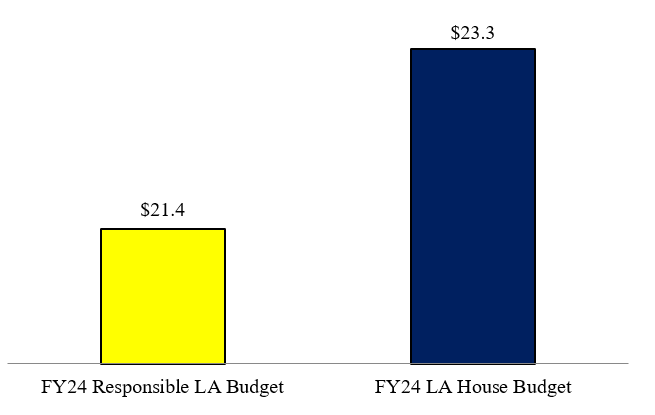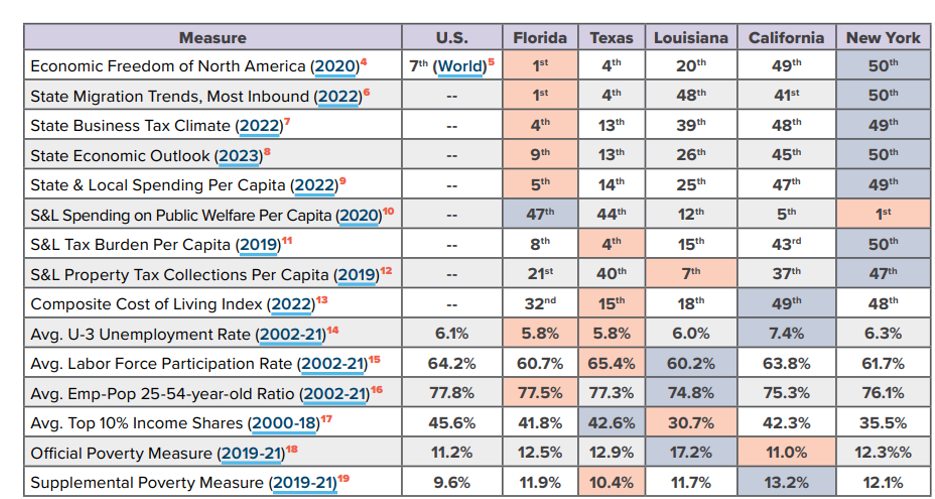|
You may have heard that the state of Louisiana is facing a “fiscal cliff” and this is why the Legislature shouldn’t reduce the taxes Louisianans pay to fund the government. This claim is based on assumptions that the state’s tax collections will decline dramatically from the expiration of the “temporary” sales tax rate hike of 45 cents in fiscal year 2025 and the potential for less tax collections from slower economic growth. But this doesn’t appear to be true. Instead, the latest reports of growth of net earnings and tax revenues in Louisiana indicate these claims of a “fiscal cliff” are likely overblown. In fact, these assumptions support a historic opportunity to provide much needed tax relief by hitting the revenue triggers for more money in Louisianans’ pockets and the need for legislators to restrain government spending. Add in the $3 billion in taxpayer money in the state’s savings accounts and we can see that the claims of a “fiscal cliff” are likely overblown. There has been strong growth in net earnings that support more income for Louisianans, which has resulted in higher taxes collected, and there’s plenty of money on the sidelines in case there’s a downturn. Instead of worrying about how the bloated government will grow, we must consider struggling taxpayers across Louisiana and ensure the revenue triggers are hit for tax relief. According to the latest report from the Bureau of Economic Analysis, Louisiana’s personal income growth was stagnant at 0.0% to $250.7 billion in 2022, which declined when adjusting for inflation. But this was driven by the negative $10 billion (-4.0-percentage points) in transfer payments from a decline in safety net payments as the expanded child tax credit expired and more people found jobs. Just considering the factors that support increased economic growth and higher tax revenue, net earnings increased by $8.4 billion (+3.4-percentage points) and other income was up by $1.6 billion (+0.6-percentage point). And given that these gains in the productive part of the economy were in the industries that pay taxes such as manufacturing, wholesale trade, professional services, and health care, the trend of higher tax collections will likely continue thereby reducing the fear of a fiscal cliff. While there are economic headwinds with elevated inflation and rising interest rates from bad policies out of D.C., Louisiana must do more to help Louisianans withstand these headwinds. A pro-growth path forward includes passing a responsible budget, not busting the spending cap, paying down debt, and hitting the revenue triggers for tax relief. There have been strides to achieve these steps in the House’s budget. Table 1 shows that more spending restraint is necessary to pass a Responsible Louisiana Budget that holds spending growth to no more than the rate of population growth plus inflation, which is a good measure for the average taxpayer’s ability to pay for government spending. Table 1. Louisiana’s FY24 State Effort in House Budget Is Above Pelican’s Proposed Responsible Louisiana Budget But even if the maximum threshold of the proposed Responsible Louisiana Budget isn’t met, there’s a grand opportunity to put money into the rainy day fund to hit the triggers put in place in 2021 for substantial relief in personal income and corporate franchise taxes. The results of lower spending and lower taxes are clear from more fiscally conservative states like Florida and Texas compared with more spending and taxes like in fiscally profligate states like California and New York. Table 2 provides a comparison of these states with Louisiana in terms of economic freedom, burden government, economic prosperity, and poverty. Table 2. States with More Economic Freedom Have Better Economic Outcomes Notes: Dates in parentheses are for that year or the average of that period. Data shaded in red indicate “best,” and in blue indicate “worst” per category by state.
Economic prosperity happens when a robust private sector has a more competitive tax system, and this starts with spending restraint and limiting government. Louisiana has the keys to do this; now there needs to be political will to overcome the overblown fears of a “fiscal cliff.” If Louisiana doesn’t, there will be more losses of people and businesses. But if the Legislature achieves this pro-growth path, there will be more opportunity to let people prosper. Originally published at Pelican Institute.
0 Comments
Leave a Reply. |
Vance Ginn, Ph.D.
|



 RSS Feed
RSS Feed